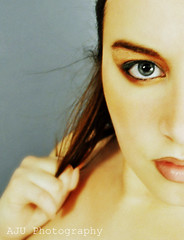
![]() photo credit: AJU_photography
photo credit: AJU_photography
The definition for trichotillomania (trick-o-tio-o-MAY-nee-ah) is often agreed upon by many medical practitioners. Its treatment, however, is not.
Trichotillomania, as defined by the Trichotillomania Learning Center, “is a disorder that causes people to pull out the hair from their scalp, eyelashes, eyebrows, pubic area, underarms, beard, chest legs or other parts of the body, resulting in noticeable bald patches.”
“Body-focused repetitive behaviors”
Trichotillomania is currently considered to be an impulse control disorder, but there are various opinions about how it should best be classified. Is it a habit? An addiction? A simple tic? An obsessive compulsive disorder?
The most common current opinion is that it belongs in the family of “body-focused repetitive behaviors”, which include skin picking, nail biting and the inability to stop pulling hair out, according to trichotillomania.org.
Inability to stop pulling hair a common symptom
One of the more prevalent symptoms is the inability to resist the urge to pull out one’s hair.
This urge can cause extreme cases of tension before the pulling actually begins. After someone has been pulling hair out, they may experience relief, or some type of gratification and relaxation.
In many cases, the behavior will begin to result in noticeable hair loss. Often wigs will be used to conceal the hair loss, which can be quite significant.
Eventually, trichotillomania interferes with day-to-day life. Sufferers may experience feelings of intense shame and humiliation. This, coupled by the fact that the condition is not well known or understood by the public or many medical practitioners, only worsens the overall affect.
Trichotillomania often leads to isolation, causing the retreat from work and play
The impact of trichotillomania can be severe. Shamed into seclusion, an individual may stop working, withdraw from events from family and friends, and even avoid medical care.
The stress on a family unit can be intense. Parents, frustrated by a lack of clear-cut answers, often incur great expense to discover a treatment. A child may withdraw from medical treatment, only heightening the difficulty.
Natural way to stop pulling hair out a step in the right direction
With so many significant problems, we’re happy to see such positive results with our natural approach.
By attacking the root problem – a depletion or imbalance of critical neurotransmitters, we’re helping people recover from this difficult condition. Contact us for a consultation on the natural way to stop pulling hair out.

